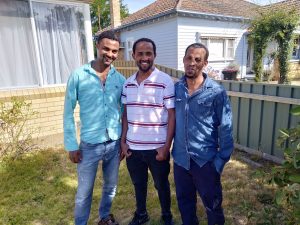Volunteer-based refugee settlement program needs work
A program that harnesses volunteers to support refugees settle in Australia has underestimated the work needed to ensure successful settlement, according to an evaluation of the program.
The Community Refugee Integration and Settlement Pilot (CRISP) aims to train community groups to provide settlement support to refugee visa holders for the first 12 months after they arrive in Australia. ‘
But University of Queensland researchers evaluating he program recommended training and resources be reviewed to better prepare supporters, and that the minimum number of volunteers in each group be increased to help share the load.
 Securing housing was the greatest challenge, with around a third of the refugee households in the study lacking long-term accommodation.
Securing housing was the greatest challenge, with around a third of the refugee households in the study lacking long-term accommodation.
The report also highlighted a need for resources to help refugees learn to drive, particularly in regional areas, where they had less access to public transport.
Researchers recommended the government keep testing the program, particularly around placing refugees in regional locations without the safety net of humanitarian settlement programs.
More than a third of volunteers found supporting refugee households “draining”, and almost two-thirds of volunteers said supporting the refugee household was “challenging”.
A few volunteers said they had underestimated the time and resources needed.
The CRISP volunteer program has settled more than 250 refugees from 64 households in its first year of operation.
The $8.6 million program funded by the Department of Home Affairs aims to settle 1,500 refugees by 2025.
The review found the program was having some positive results, with refugees settled by volunteers more likely to feel welcome, make friends and have a wider support network to draw upon if they needed help.
The experience was mostly positive for the volunteers, too, but the report highlighted opportunities to improve.
Researchers recommended the government keep testing the program, particularly placing refugees in regional locations without the safety net of humanitarian settlement programs.
Immigration Minister Andrew Giles said he was interested in the possibilities the program presented.
“We hope that we can significantly expand it and make a big contribution to what is, unfortunately, a global humanitarian crisis right now,” he said.
The Community Refugee Sponsorship Australia (CRSA), the organisation leading the pilot, said the program should allow people to nominate who they sponsor to strengthen ties and support for arriving refugees.
Mr Giles said some of those discussions were already underway.
“Our vision for the future is for these forms of refugee arrivals — community sponsorship, or complementary pathways — to be additional to the government program,” he said.
Volunteer organisation Rural Australians for Refugees (RAR) has supported almost 40 humanitarian visas for refugees from Afghanistan.
The national president, the Rev Paul Dalzell, says the Victorian high country town of Mansfield recently welcomed a group of Hazara refugees, assisting them to source work, learn English and volunteer in the Country Fire Authority and local theatre.












